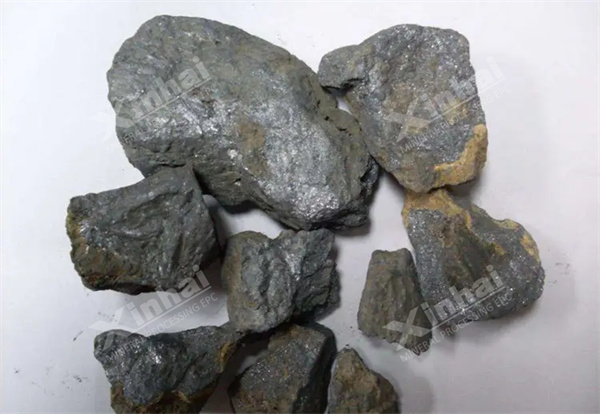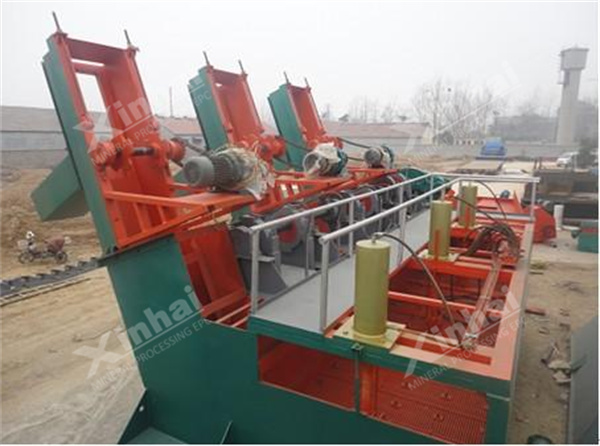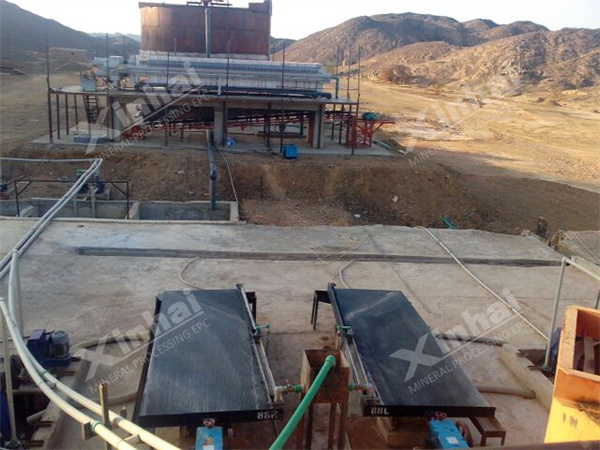Stibnite is a relatively rare secondary mineral, a product of stibnite or natural antimony oxidation, with the main component being Sb2O3. It is found in places such as Guangdong, China, and Algeria.
As an antimony oxide ore, the common ore dressing method is gravity separation, using equipment such as jigging machines and shaking tables. Let's explore the ore dressing equipment and methods for stibnite together.

Stibnite is often coarse-grained, with a grain size between 3-5mm. There is a clear boundary between antimony minerals and gangue minerals. The specific gravity of stibnite is 5.22-5.78, making it suitable for gravity separation due to its significant density difference with gangue minerals.
For coarse-grained stibnite, the typical ore dressing process includes crushing, fine crushing, coarse grinding, jigging, and shaking table separation. The original ore is first crushed into coarse particles, followed by fine crushing, entering the rod mill for coarse grinding. The purpose of coarse grinding in the rod mill is to increase the monomer dissociation of antimony minerals and gangue minerals while avoiding over-crushing. After coarse grinding, stibnite is mostly fully monomer dissociated. Antimony minerals are then recovered by jigging, which can directly obtain the final concentrate. Alternatively, it can be used as a rough selection process, obtaining a rough concentrate that can be further purified using a shaking table.
The ore dressing method and process for stibnite are simple and effective, providing good ore dressing indicators. The equipment investment is small, production costs are low, and ore dressing efficiency is high, making it an ideal method for stibnite ore dressing.
The ore dressing method mentioned above is a general approach. Specific ore dressing for stibnite requires a rational design of process flow and equipment configuration based on the properties and characteristics of antimony ore to ensure that ore dressing indicators meet expectations.
Jigging Machine
The jigging machine is a gravity separation device that separates light and heavy minerals based on their different specific gravities. It is used for the separation of gold, tin, antimony, tungsten, titanium, iron, coal, and other minerals, especially widely used in the manganese ore dressing field.

Advantages of the jigging machine
XinHai jigging machine uses an electromagnetic adjustable motor for drag, enabling smooth and stepless adjustment.
The jigging machine can be used for both fine and coarse material selection, with an upper limit particle size of 6-8mm.
For some selected sand ore dressing plants, XinHai jigging machine can handle particles with an upper limit size of up to 12mm.
Large processing capacity, wide range of particle size selection.
Occupies 1/3 less space compared to conventional jigging machines, with a large processing capacity per unit area.
Shaking Table (6s Shaking Table)
6s shaking table equipment can be used for rough selection, fine selection, and scavenging, handling different materials such as coarse sand (2-0.5mm), fine sand (0.5-0.074mm), and ore slurry (-0.074) at different particle sizes. When processing tungsten, tin, and other ores, the effective recovery particle size range of 6s shaking table is 2-0.22mm, and it can also be used for the selection of antimony, iron, manganese ores.

Advantages of the shaking table
The shaking table has a wide range of lateral slope adjustment (0~10°) and easy stroke adjustment.
The table surface is flat, corrosion-resistant, sturdy, durable, not easily deformed, and easy to repair locally.
When changing the lateral slope and stroke, the shaking table can maintain stable operation.
The springs are placed inside the box, compact structure.
The head of the table has reliable operation, few wear parts, and no oil leakage.
The shaking table has a reasonable price, does not consume reagents, and has low power consumption.
The above information provides an introduction to the ore dressing methods and equipment for stibnite. XinHai Mining provides customers with a complete industry chain service, from ore dressing experiments to ore dressing process design, manufacturing of ore dressing equipment, plant operation and production, offering a one-stop service. If you have ore dressing needs, please contact us!